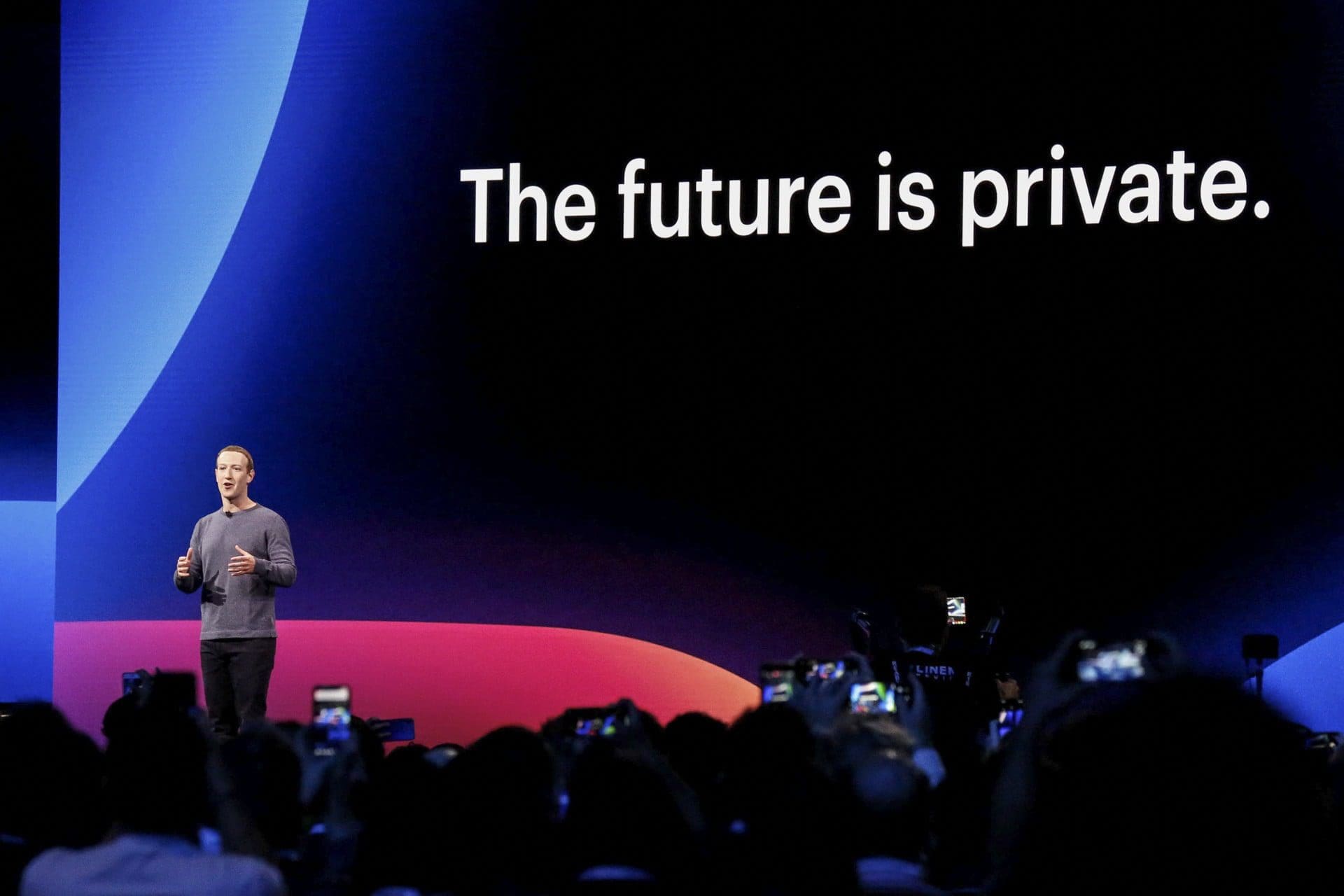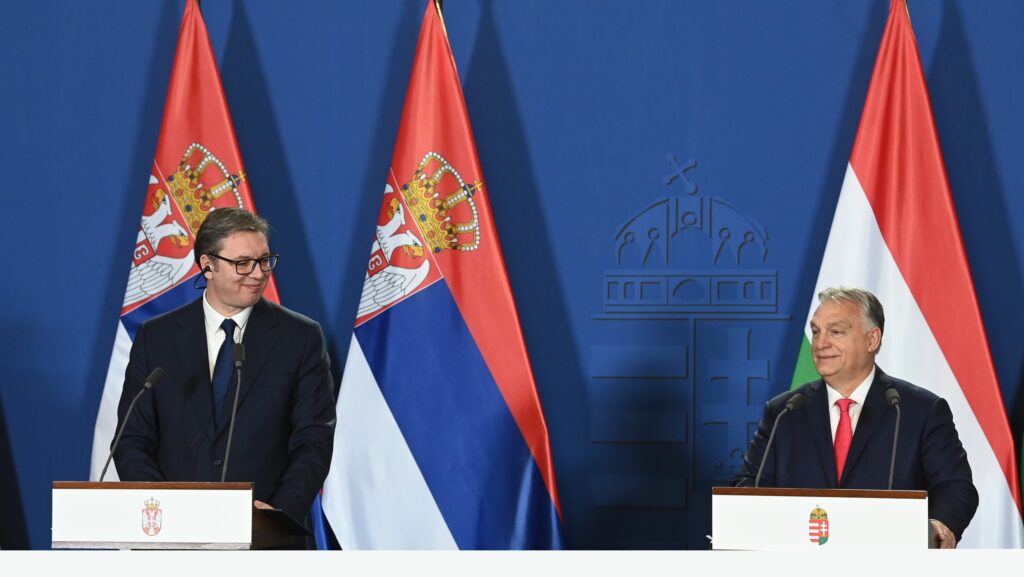Events flash before our eyes, and yet—perhaps precisely because of their speed—we are unable to comprehend exactly what is happening. We think our conscious mind is rational, that we are guided by logical thinking, and so are able to understand everything ‘scientifically’— then it often turns out that (virtual) reality is messing with us. The impulse explosion of the twenty-first century, the generally unsolicited but unavoidable rush of information, the experience of the postmodern form of ‘be there or be square’ in the form of FOMO (‘fear of missing out’) disturbs our concentration, preventing us from seeing the truly important things beneath the constantly moving surface of life. This is also the case in public life and politics—daily conflicts, struggles, campaigns, elections, the EU and rule of law debates, free trade clusters and the like, all distract the focus not only of our eyes, but also of our brains and intellect, from the question that should be asked before all others.
And that question is: where does ultimate power lie? Who and what will exercise, in the future, the formal or informal ability or authority to determine the principles, rules, and practices upon which an organized society should operate? That is why the Center for Fundamental Rights launched a research project last year to find answers to this basic question. We are at the dawn of a new age, but also on the threshold of, at minimum, a dimensional shift: our relationship with the state will fundamentally change in the coming decades. It may be steered in a positive or negative direction, but the trend is irreversible. For the holder of a supreme, sovereign power, the state is being attacked so frequently and ferociously that its hitherto familiar character will either diminish or increase, if we turn to it as a ‘refuge of last resort’.
Carl Schmitt’s dictum that ‘the sovereign is he who decides on the state of exception’ is no less true for being overused. But what if this decision-making power is increasingly being squeezed out of the hands of the state? Or if we are actually living in a ‘state of permanent exception’ where (for now) the state is the only pro forma sovereign, but where, in practice, more and more ‘co-sovereigns’ are appearing on the scene? Or what if this struggle for sovereignty is ‘merely’ an ‘aspect’ of the security-geostrategic struggles of our time, the essence of which is that in an ever-expanding proxy war, imperial, colonizing entities (states or state-like formations) fight each other using hybrid means, and to whom ‘minor powers’ fall victim?
Of course, it is said that state sovereignty —exclusive supremacy over a territory and its population—is no longer what it used to be. The state has relaxed its grip on the monopoly on criminal justice (private prosecution), it has submitted itself to other decision-making forums outside its sphere of influence (international courts) or delegated to another institution (the EU) the powers deriving from its sovereignty. This is true, but it must be added that these concessions were made voluntarily by the state, on the basis of pre-established rules, with the possibility of withdrawal. (That is, ultimate power actually remained intact all along.) Of course, it is not as though these phenomena have all now suddenly emerged from their respective slumbers. Perhaps it is rather that these processes have now aggregated to such a degree, supported by the indoctrinating output of so many manufacturers of popular consumer taste, that the question can no longer be avoided: who will determine the basic principles and practices of social organization in the future, and upon what authority?
However, the new ‘competing (cyber) sovereigns’ were not created with the tacit or active approval of the state—or, if they were, they have now grown far beyond their original scope, and their activities are aimed at the erosion of state sovereignty. I am thinking here of very institutionalized processes: the development of global constitutional law and the network that serves it; the globalization of economy and finance; or, for example, the emerging ‘digital sovereignty’ of IT giants, which rivals that of states.
The process points in a direction that is already being widely discussed: the traditional division between Right and Left is transforming into a new global–local, federalist–sovereigntist, multicultural– national fault line. Whatever we call the ‘new (virtual) dimensions’ of disagreement, the unifying thread is that while one side sees the foundation of ‘good order’ as lying in transnational meta-organizations (empires, the cloud, or ‘big data’) that eventually merge with each other, the opposition is made up of demarcated social entities that are nourished by a sense of place. The tension between these opposing perspectives is, of course, no mere organizational sociology debate: much more than that, it is a strand woven into the conflict between a postmodern ideology of ‘progress’ and the concept of Christian liberty in a battle to monopolize the conceptual framework of the modern world.
Strategic autonomy of decision-making
‘A country is not a country without borders’, Donald Trump said a few years ago, speaking of the harsh measures he had enacted against migration from Mexico. This remark, however, also implied a more general concept: a state is not a state without sovereignty—that is, real self-determination. We could also put it this way: sovereignty is strategic autonomy in decision-making. This power of self-determination, this ‘autonomy’, is now being challenged in a thousand ways, and the contours of a new and more tendentious test of state sovereignty are perhaps only now, vaguely, beginning to emerge. In addition to the various international organizations acting in the name of ‘multi-layered constitutionality’ and their hydra-headed appendages, as well as economic and financial conglomerates which push development policy resources, aid or rescue packages with concealed ideological strings attached, the institutional and intellectual impact of digital technology behemoths is increasingly felt.
First of all, we have to see that a public lawfare is brewing between various international political organizations—and the empires that employ them for their own interests—and the (other) states. The situation is that international bureaucracies (the UN, the EU, the Council of Europe, etc.) which are unelected, or possess at best indirect legitimacy, ‘professional-scientific’ advisory bodies (the Venice Commission, the UNHCR), international—and often national—courts, and the political mafia, which works closely with them while disguising itself as a defender of the law, are working to create a ‘global constitutional layer’ in Béla Pokol’s words. The point is that the malleable ambiguity of ‘international standards’ or ‘EU values’ takes precedence over state-created law, as liberal interpretations (of presumed exclusive validity) of the ‘rule of law’, ‘democracy’, and ’human rights’ override any ‘oppositional’ legislative will. In many cases, of course, states themselves have voluntarily joined these organizations, subjecting themselves to international regimes, but the original treaties did not mention rewriting these agreements with overly broad legal interpretations and stealthy legislation. In the name of human rights, they are essentially demoting the state, shrinking sovereignty into an ever more mythical concept as they ‘discover’ a continually expanding corpus of universal rights. It was an act of historical naivety, then, to put all rights on a human rights footing, so that today we are no longer surprised to hear talk of ‘democracy rebelling against liberalism’. The ultimate meaning of the international constitutionality that this emerging juristocracy seeks to create is to replace elections and the will of the people as the source of legitimate state power, so that by internationalizing national constitutionality, the state can rapidly be dissolved into a higher structure.
Secondly, it is also worth noting that the cosmopolitan financial elite has ‘depoliticized the economy, but economized politics’, as Márton Békés put it. That is, while state control/ownership was pushed into the background, state decision-making increasingly became a prisoner of market forces. Individual international financial organizations, free trade agreements, and arbitration courts have the right to instruct relevant state leaders through the assessment of various subsidies and rescue packages, the conditions imposed on them, and the settlement of legal disputes. For example, State Secretary Tamás Schanda has rightly pointed out in the past that the EU intervenes in policies that fall within the competence of the state by attaching to the support system conditions that serve the interests and goals of Western Europe. The industrial, financial, and economic technocracy, which owns and controls strategic sectors and public utilities, has an extensive influence on (or over) sovereign decision-makers. The coercion applied here may formally be soft, but that just makes it all the more inescapable: by influencing currency or bond securities markets, privatizing crucial sectors and social distribution systems, and enforcing liberalization, these ‘invisible infrastructures’ can exercise considerable control.
The problem itself is elusive because it is virtual
Last but not least, there are the virtual data integrators of the global establishment, the IT giants, who are often more a part of our lives than our own families, and are slowly coming to know more about us not just than the state, but than we ourselves know. Here, it is especially necessary to speak about these (apparently) virtual actors who pose the most appealing, yet also most dangerous, challenge to state sovereignty. As a consequence of free speech disputes and personal data leaks, we tend to think exclusively of ‘tech giants’ like Facebook or Google in this regard, but the point actually applies to the entire digital IT sector, from cryptocurrency traders and deep/dark web operators to the entire Internet content industry. The root of the problem, of course, is that—let us not be naive or hypocritical—‘the Internet’ is in fact globalization made manifest: a huge leap for mankind—but is it for the individual, or for the state? It is a fact that each generation has always seemed to interpret the sense of ‘us’, that is, the in-group, more and more broadly—and now there are efforts to extend this to the whole world. And imperial aspirations powered by colonializing attitudes have never done any real good for either the individual or the nation.
But to come one step closer to the specific problem, we have to realize that the digital ‘quasi-sovereigns’ of Silicon Valley pose both a technical-institutional threat
to the state itself and an ideological-spiritual challenge to the conservative right, which places emphasis on national myths and the spirit of place. In relation to the former, the current seemingly insoluble problem is that new, virtual—which is to say, ‘operating without a fixed territory’— actors in the private sector are difficult to grasp for the state, which establishes and operates fundamentally territorial regulatory regimes. Moreover, it has rightly been noted in a Századvég Foundation study of the Facebook case that ‘the mere existence of large tech companies (…) calls into question the validity of this sovereignty. Can state sovereignty even be said to exist if a social media company that is one of the greatest influences on our lives does not fall within the scope of some state (or even multi-state) regulation?’ And not only do they ‘evade’—and thus constantly ‘dissolve’—state sovereignty, but they are also slowly overtaking states in terms of ‘social knowledge’: power was never merely about the ‘hard tools’ of regulation or military force, but also the ‘soft capabilities’ of information and control of data. Through data collection, phishing, and data integration within the invisible infrastructures of IT giants, the monopolization of ‘big data’, and the commodification of personal information— and behind their cheerful, virtue signalling PR front—these companies have a concealed knowledge of us which potentially gives them even greater power, while also introducing certain serious cyber-security risk factors: critical public IT infrastructure can become an open gateway for them in seconds. In addition, with the tacit (or rather unconscious) consent of society, these ‘new gatekeepers’ have also gained control over the distribution and allocation of information, and so are able to effectively manipulate awareness through controlled search engine results and manipulated algorithms. (See, for instance, the process of the 2020 US presidential election.) The intellectual danger is, of course, that they will slowly become monopolies of opinion through social control. And only the blind cannot see that sufficiently progressive information is the only kind able to pass through the filter of their censorship, while the rest falls victim to digital totalitarianism: this opens up a wide scope for potential intervention, from electoral manipulation to the discrediting of political groups—or even political leaders.
‘It’s the ideology, stupid!’
All this leads us from the ‘dry’, formal institutional-regulatory problem to some extremely virulent ideological flashpoints. Mark Zuckerberg himself illustrated this point rather well, in his 2017 commencement address at Harvard: ‘This is the struggle of our time. The forces of freedom, openness and global community against the forces of authoritarianism, isolationism and nationalism. Forces for the flow of knowledge, trade and immigration against those who would slow them down. This is not a battle of nations, it is a battle of ideas. There are people in every country for global connection and good people against it.’ Indeed, it is these global associations of the like-minded that are perhaps most visible on social media sites: while always careful to describe their platforms as neutral intermediaries, thus exempting themselves from state media regulation, it is clear that their ‘content regulation’ (censorship) is based on an ideology of contemporary postmodern progressive ‘values’. They claim to defend democracy, but never practice it themselves. Their discursive power on fundamental social issues is always put at the service of liberal causes: as a prominent Google engineer put it after he went rogue, Silicon Valley is dominated by a politically correct monoculture that immediately attacks those who do not profess the dominant, left-wing ideology of the tech industry. In return, with their mental modules, they make hundreds of millions aware when it comes to Pride Month, migration, Joe Biden’s campaign, or the emancipation of certain minorities and the ‘social justice struggle’.
The citizen in danger
However, these tendencies pose a threat not only to the state but also to citizens: these are actors without ‘electoral legitimacy’, and their attitude towards the rules is very selective, irresponsible, and unaccountable. Their image, though hidden behind a friendly veneer, and backed by corporate social responsibility and sensitivity campaigns, is interwoven with a dense web of deceit, causing severe damage first to the state and then to individuals fascinated by the magnetic attraction of transnational humanity. Citizens must therefore ally with the state and common sense: together, these forces are still stronger than their opponents.
It is quite obvious, then, that digital (media) giants and their ilk are political actors, fighting for political goals and acting according to political logic. While they themselves have been ‘disappointed’ by democracy—after all, it was at the ‘beginning’ of the Web 2.0 that we were promised that the ‘virtual socialization’ of public discourse would democratize the world—if a government with real legitimacy so much as raises the necessity of regulation, they shriek about an attack on democracy and free speech. However, those who are still formally in power must act, if the state is to protect itself and its citizens. These measures could include the extension of media rules, antitrust measures, closer bilateral cooperation in tax matters, or the declaration of an Internet service as a public service or concession. Indeed, it could even involve ensuring that the providers of the physical infrastructure used by these digital giants are subject to a regulatory environment that necessitates more effective cooperation with the state. Of course, these changes should be introduced as soon as possible, if we do not want to see Zuckerberg posting on Facebook about the global governance programme someday soon. The aforementioned research project of the Center for Fundamental Rights also came up with several possible alternatives to this problem, not forgetting, of course, the teachings of the Bible: ‘So then it is not of him that willeth, nor of him that runneth, but of God that sheweth mercy’ (Romans 9:16).








